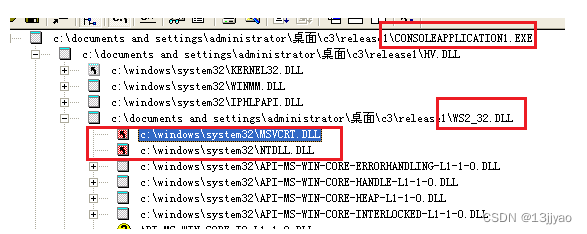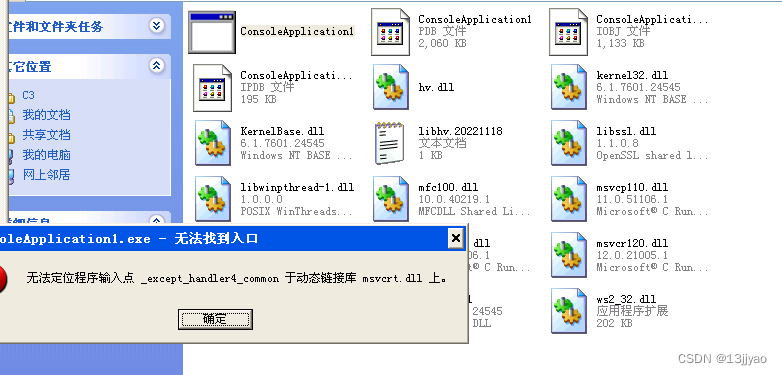项目情况:
调用第三方网络库(hv库),在win7/8/10等系统都运行正常,在XP系统提示“ 无法定位程序输入点WSAPoll于动态链接库ws2_32.dll”
产生原因:
第三方网络库(hv库)使用到了wsapoll,inet_pton,inet_ntop等函数,这些函数是定义在系统库ws2_32.dll里面的,而XP系统的ws2_32.dll库并没有这些函数。这些函数在 Windows Vista 及更高版本上才被定义。
解决思路(可以直接看思路3):
思路1:最简单,更新系统呗,不用XP;等于没解决
思路2: 换系统库呗。我把win7以上的ws2_32.dll拷过去还不行?
①拷贝到C:\Windows\System32; 可以吗?不行,这里的库只有安全模式可以更改,总不能每台机器都整;
②拷贝到程序当前目录可以吗?不行。看下图,程序的的确确找到了WS2_32.DLL,但是WS2_32.DLL又依赖系统库MSVCRT.DLL,但是XP系统的MSVCRT.DLL,又缺少了win 7 WS2_32.DLL要调用的函数,所以就这样层层报错。我试过把win7的MSVCRT.DLL和依赖库全部拷过来,xp系统也会找C:\Windows\System32上面的MSVCRT.DLL,即使修改环境变量也不起效。


思路3: 改第三方网络库(hv库)的源码。不是报几个函数在XP的WS2_32.DLL没定义吗,那我自己写还不行吗?
①WSAPOLL函数,我参考thrift库重写(名字要修改不要重定义):
thrift库:Index of /dist/thrift 我用的是0.12.0
typedef struct timeval2
{
double tv_sec; /* seconds */
double tv_usec; /* microseconds */
}timeval;
# define THRIFT_POLLIN 0x0300
# define THRIFT_POLLOUT 0x0010
/// 需要屏蔽此行
int thrift_poll1(WSAPOLLFD *fdArray, ULONG nfds, INT timeout)
{
fd_set read_fds, write_fds;
fd_set* read_fds_ptr = NULL;
fd_set* write_fds_ptr = NULL;
FD_ZERO(&read_fds);
FD_ZERO(&write_fds);
for (ULONG i = 0; i<nfds; i++) {
//Read (in) socket
if ((fdArray[i].events & THRIFT_POLLIN) == THRIFT_POLLIN) {
read_fds_ptr = &read_fds;
FD_SET(fdArray[i].fd, &read_fds);
}
//Write (out) socket
if ((fdArray[i].events & THRIFT_POLLOUT) == THRIFT_POLLOUT) {
write_fds_ptr = &write_fds;
FD_SET(fdArray[i].fd, &write_fds);
}
}
timeval time_out;
timeval* time_out_ptr = NULL;
if (timeout >= 0) {
timeval time_out = { timeout / 1000, (timeout % 1000) * 1000 };
time_out_ptr = &time_out;
}
else { //to avoid compiler warnings
(void)time_out;
(void)timeout;
}
int sktready = select(1, read_fds_ptr, write_fds_ptr, NULL, time_out_ptr);
if (sktready > 0) {
for (ULONG i = 0; i<nfds; i++) {
fdArray[i].revents = 0;
if (FD_ISSET(fdArray[i].fd, &read_fds))
fdArray[i].revents |= THRIFT_POLLIN;
if (FD_ISSET(fdArray[i].fd, &write_fds))
fdArray[i].revents |= THRIFT_POLLOUT;
}
}
return sktready;
}
//WSAPOLL函数
int WINAPI myWSAPoll(WSAPOLLFD *wfds, ULONG count, int timeout)
{
return thrift_poll1(wfds, count, timeout);
}②inet_pton和inet_ntop,我参考glibc库重写(名字要修改不要重定义):
glibc库:Index of /pub/gnu/glibc 我用的是glibc-2.36
inet_pton:
#define NS_INADDRSZ 4 /*%< IPv4 T_A */
#define NS_IN6ADDRSZ 16 /*%< IPv6 T_AAAA */
#define NS_INT16SZ 2 /*%< #/bytes of data in a uint16_t */
static int inet_pton4(const char *src, const char *end, unsigned char *dst)
{
int saw_digit; // 每个八位组是否遇到数字标记,新的八位组将会清除标记
int octets; // 八位组的个数,ip地址合法,则为4个
int ch; // 遍历字符串,每次获得的字符
// NS_INADDRSZ长度是4个字节, 宏定义在nameser.h中
// 注意tmp不是字符串,仅仅是用来存放4个字节的数据,无'\0'
unsigned char tmp[NS_INADDRSZ];
unsigned char *tp; // tp指的是八位组
saw_digit = 0;
octets = 0;
*(tp = tmp) = 0; // *tp = 0;初始化必须为0,计算数值的时候会有依赖
// 本函数实际上是转换成网络序的,所以方向是src -> end
// 如果仅仅转换成二进制,方向是end -> src
while (src < end)
{
ch = *src++; // 得到获得的ASCII值,src指向下一个字符
if (ch >= '0' && ch <= '9')
{
// 八位组迭代,比如192.168.8.217
// 以192为例:
// 0 -> 0 * 10 + 1 = 1 -> 1 * 10 + 9 = 19 -> 19 * 10 + 2 = 192
// 在将192赋值到tmp的第一个字节上(第一个八位组)
unsigned int new = *tp * 10 + (ch - '0');
// 八位组中不能以0开头,比如192.168.08.217是错误的
if (saw_digit && *tp == 0)
return 0;
// 某一个八位组值不能超过255
if (new > 255)
return 0;
// 八位组赋值
*tp = new;
// 一般是在遇到'.'的时候,(! saw_digit)为0
// 而在'.'之后的第一个数字置为1
// 统计八位组的数目,由于在运行中,所以值不得超过4
if (!saw_digit)
{
if (++octets > 4)
return 0;
saw_digit = 1;
}
}
else if (ch == '.' && saw_digit)
{
if (octets == 4)
return 0;
// 下一个八位组赋值,必须为0,方面迭代
// saw_digit标记为未遇到数值
*++tp = 0;
saw_digit = 0;
}
else
return 0; // 其他字符,直接返回错误
}
if (octets < 4)
return 0;
memcpy(dst, tmp, NS_INADDRSZ);
return 1;
}
static int hex_digit_value(char ch)
{
if ('0' <= ch && ch <= '9')
return ch - '0';
if ('a' <= ch && ch <= 'f')
return ch - 'a' + 10;
if ('A' <= ch && ch <= 'F')
return ch - 'A' + 10;
return -1;
}
static int inet_pton6(const char *src, const char *src_endp, unsigned char *dst)
{
unsigned char tmp[NS_IN6ADDRSZ], *tp, *endp, *colonp;
const char *curtok;
int ch;
size_t xdigits_seen; /* Number of hex digits since colon. */
unsigned int val;
tp = memset(tmp, '\0', NS_IN6ADDRSZ);
endp = tp + NS_IN6ADDRSZ;
colonp = NULL;
/* Leading :: requires some special handling. */
if (src == src_endp)
return 0;
if (*src == ':')
{
++src;
if (src == src_endp || *src != ':')
return 0;
}
curtok = src;
xdigits_seen = 0;
val = 0;
while (src < src_endp)
{
ch = *src++;
int digit = hex_digit_value(ch);
if (digit >= 0)
{
if (xdigits_seen == 4)
return 0;
val <<= 4;
val |= digit;
if (val > 0xffff)
return 0;
++xdigits_seen;
continue;
}
if (ch == ':')
{
curtok = src;
if (xdigits_seen == 0)
{
if (colonp)
return 0;
colonp = tp;
continue;
}
else if (src == src_endp)
return 0;
if (tp + NS_INT16SZ > endp)
return 0;
*tp++ = (unsigned char)(val >> 8) & 0xff;
*tp++ = (unsigned char)val & 0xff;
xdigits_seen = 0;
val = 0;
continue;
}
if (ch == '.' && ((tp + NS_INADDRSZ) <= endp)
&& inet_pton4(curtok, src_endp, tp) > 0)
{
tp += NS_INADDRSZ;
xdigits_seen = 0;
break; /* '\0' was seen by inet_pton4. */
}
return 0;
}
if (xdigits_seen > 0)
{
if (tp + NS_INT16SZ > endp)
return 0;
*tp++ = (unsigned char)(val >> 8) & 0xff;
*tp++ = (unsigned char)val & 0xff;
}
if (colonp != NULL)
{
/* Replace :: with zeros. */
if (tp == endp)
/* :: would expand to a zero-width field. */
return 0;
size_t n = tp - colonp;
memmove(endp - n, colonp, n);
memset(colonp, 0, endp - n - colonp);
tp = endp;
}
if (tp != endp)
return 0;
memcpy(dst, tmp, NS_IN6ADDRSZ);
return 1;
}
int __inet_pton_length(int af, const char *src, size_t srclen, void *dst)
{
switch (af)
{
case AF_INET:
return inet_pton4(src, src + srclen, dst);
case AF_INET6:
return inet_pton6(src, src + srclen, dst);
default:
//__set_errno(EAFNOSUPPORT);
return -1;
}
}
//inet_pton
int __inet_pton(int af, const char *src, void *dst)
{
return __inet_pton_length(af, src, strlen(src), dst);
}inet_ntop:
#ifdef SPRINTF_CHAR
# define SPRINTF(x) strlen(sprintf/**/x)
#else
# define SPRINTF(x) ((size_t)sprintf x)
#endif
static const char *inet_ntop4(const u_char *src, char *dst, socklen_t size)
{
static const char fmt[] = "%u.%u.%u.%u";
char tmp[sizeof "255.255.255.255"];
if (SPRINTF((tmp, fmt, src[0], src[1], src[2], src[3])) >= size) {
//__set_errno(ENOSPC);
return (NULL);
}
return strcpy(dst, tmp);
}
/* const char *
* inet_ntop6(src, dst, size)
* convert IPv6 binary address into presentation (printable) format
* author:
* Paul Vixie, 1996.
*/
static const char *inet_ntop6(const u_char *src, char *dst, socklen_t size)
{
/*
* Note that int32_t and int16_t need only be "at least" large enough
* to contain a value of the specified size. On some systems, like
* Crays, there is no such thing as an integer variable with 16 bits.
* Keep this in mind if you think this function should have been coded
* to use pointer overlays. All the world's not a VAX.
*/
char tmp[sizeof "ffff:ffff:ffff:ffff:ffff:ffff:255.255.255.255"], *tp;
struct { int base, len; } best, cur;
u_int words[NS_IN6ADDRSZ / NS_INT16SZ];
int i;
/*
* Preprocess:
* Copy the input (bytewise) array into a wordwise array.
* Find the longest run of 0x00's in src[] for :: shorthanding.
*/
memset(words, '\0', sizeof words);
for (i = 0; i < NS_IN6ADDRSZ; i += 2)
words[i / 2] = (src[i] << 8) | src[i + 1];
best.base = -1;
cur.base = -1;
best.len = 0;
cur.len = 0;
for (i = 0; i < (NS_IN6ADDRSZ / NS_INT16SZ); i++) {
if (words[i] == 0) {
if (cur.base == -1)
cur.base = i, cur.len = 1;
else
cur.len++;
}
else {
if (cur.base != -1) {
if (best.base == -1 || cur.len > best.len)
best = cur;
cur.base = -1;
}
}
}
if (cur.base != -1) {
if (best.base == -1 || cur.len > best.len)
best = cur;
}
if (best.base != -1 && best.len < 2)
best.base = -1;
/*
* Format the result.
*/
tp = tmp;
for (i = 0; i < (NS_IN6ADDRSZ / NS_INT16SZ); i++) {
/* Are we inside the best run of 0x00's? */
if (best.base != -1 && i >= best.base &&
i < (best.base + best.len)) {
if (i == best.base)
*tp++ = ':';
continue;
}
/* Are we following an initial run of 0x00s or any real hex? */
if (i != 0)
*tp++ = ':';
/* Is this address an encapsulated IPv4? */
if (i == 6 && best.base == 0 &&
(best.len == 6 || (best.len == 5 && words[5] == 0xffff))) {
if (!inet_ntop4(src + 12, tp, sizeof tmp - (tp - tmp)))
return (NULL);
tp += strlen(tp);
break;
}
tp += SPRINTF((tp, "%x", words[i]));
}
/* Was it a trailing run of 0x00's? */
if (best.base != -1 && (best.base + best.len) ==
(NS_IN6ADDRSZ / NS_INT16SZ))
*tp++ = ':';
*tp++ = '\0';
/*
* Check for overflow, copy, and we're done.
*/
if ((socklen_t)(tp - tmp) > size) {
//__set_errno(ENOSPC);
return (NULL);
}
return strcpy(dst, tmp);
}
//inet_ntop
const char *inet_ntop1(int af, const void *src, char *dst, socklen_t size)
{
switch (af) {
case AF_INET:
return (inet_ntop4(src, dst, size));
case AF_INET6:
return (inet_ntop6(src, dst, size));
default:
//__set_errno(EAFNOSUPPORT);
return (NULL);
}
/* NOTREACHED */
}




















 1488
1488











 被折叠的 条评论
为什么被折叠?
被折叠的 条评论
为什么被折叠?








